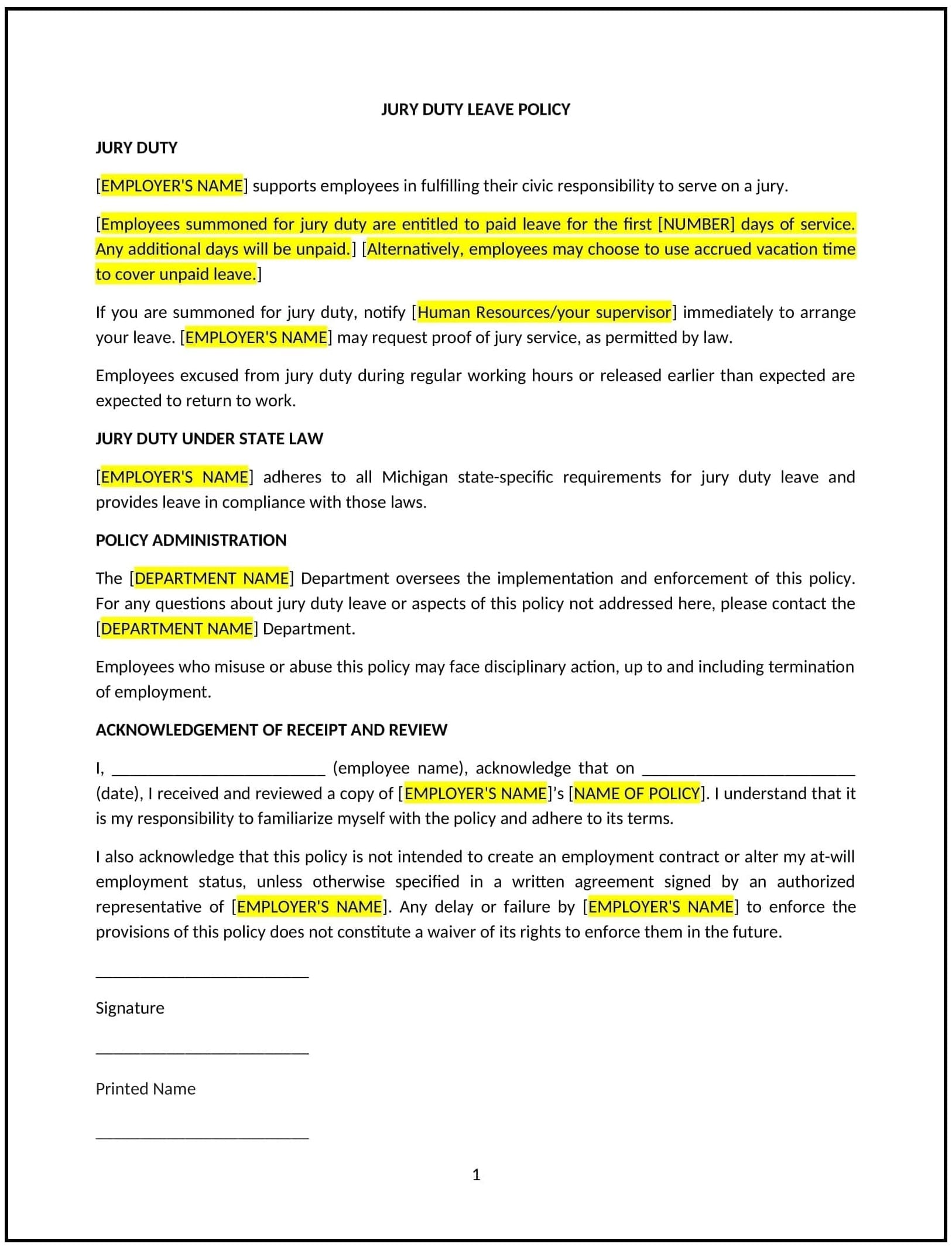Got contracts to review? While you're here for policies, let Cobrief make contract review effortless—start your free review now.

Customize this template for free
Jury duty leave policy (Michigan)
A jury duty leave policy provides Michigan businesses with guidelines for supporting employees who are required to serve on a jury. This policy outlines the procedures for requesting leave, the compensation during jury duty, and the rights and responsibilities of both the business and the employee.
By adopting this policy, businesses can promote civic responsibility, ensure legal compliance, and maintain a positive relationship with employees by respecting their obligations to serve on a jury.
How to use this jury duty leave policy (Michigan)
- Define eligibility: Specify which employees are eligible for jury duty leave, typically including full-time and part-time employees who have worked for the business for a minimum duration (e.g., 6 months or 1 year).
- Outline the leave process: Provide clear procedures for employees to request jury duty leave, including the necessary documentation, such as a jury summons, and the timeline for submitting the request in advance.
- Address compensation during jury duty: Clarify whether employees will receive full or partial pay during their jury service. In Michigan, businesses are not required to pay employees for time off for jury duty, but they may choose to do so voluntarily.
- Ensure job protection: Specify that employees will be allowed to return to their job or an equivalent position after completing jury duty, ensuring job protection under Michigan law.
- Set expectations for documentation: Require employees to submit proof of jury duty service, such as a copy of the jury summons or a statement from the court, to verify the time taken off for jury duty.
- Manage operational impact: Provide guidance for employees on how to minimize disruptions while on jury duty, such as providing adequate notice, cross-training, or allowing flexibility in meeting work responsibilities if needed.
- Review and update policy: Periodically review the policy to ensure it aligns with changes in Michigan laws, business practices, and employee needs.
Benefits of using this jury duty leave policy (Michigan)
This policy provides several key benefits for Michigan businesses:
- Complies with legal requirements: The policy ensures that the business adheres to Michigan state laws regarding jury duty, reducing the risk of legal claims or penalties for non-compliance.
- Promotes civic engagement: By providing time off for jury duty, businesses support employees’ civic responsibilities, encouraging active participation in the judicial system.
- Enhances employee morale: Offering jury duty leave and job protection shows employees that the business values their contributions and respects their obligations outside of work, which can improve morale and loyalty.
- Reduces absenteeism: A clear jury duty leave policy helps employees plan their time off, reducing unplanned absenteeism and providing a structured process for managing leave.
- Fosters positive employer-employee relations: By supporting employees during jury duty, businesses foster trust and goodwill, improving the overall working environment.
Tips for using this jury duty leave policy (Michigan)
- Communicate the policy clearly: Ensure that all employees are aware of the jury duty leave policy by including it in the employee handbook, during onboarding, and through regular reminders.
- Keep records: Maintain records of jury duty leave requests and employee service to ensure compliance with the policy and track time taken off for jury duty.
- Offer flexibility: If possible, offer flexibility to employees who may need to adjust their work schedules around jury duty, such as allowing them to make up missed hours or work remotely.
- Ensure consistent application: Apply the policy consistently across all employees to ensure fairness and avoid potential claims of favoritism.
- Review and update regularly: Regularly review and update the policy to ensure it remains compliant with Michigan state laws and aligns with the business’s needs.